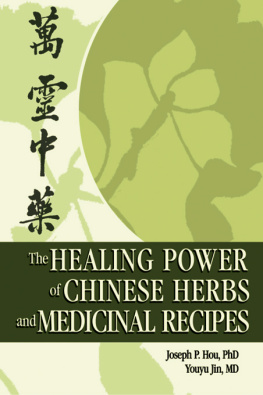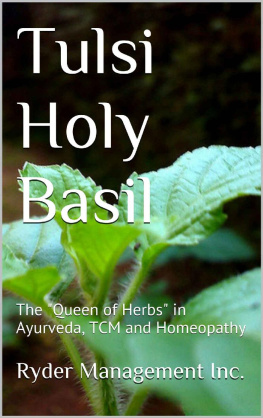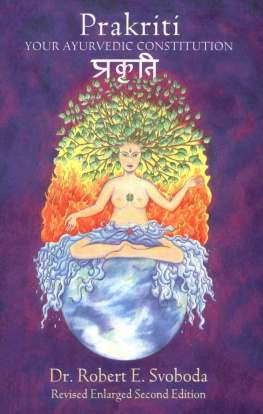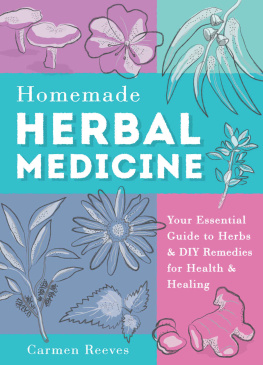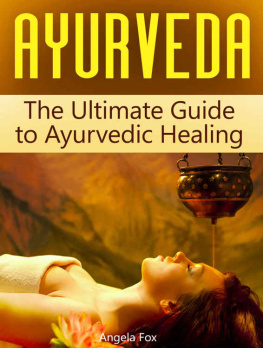Lad Vasant - The yoga of herbs : an Ayurvedic guide to herbal medicine
Here you can read online Lad Vasant - The yoga of herbs : an Ayurvedic guide to herbal medicine full text of the book (entire story) in english for free. Download pdf and epub, get meaning, cover and reviews about this ebook. City: Santa Fe, N.M, year: 2001,1986, publisher: Lotus Press, genre: Romance novel. Description of the work, (preface) as well as reviews are available. Best literature library LitArk.com created for fans of good reading and offers a wide selection of genres:
Romance novel
Science fiction
Adventure
Detective
Science
History
Home and family
Prose
Art
Politics
Computer
Non-fiction
Religion
Business
Children
Humor
Choose a favorite category and find really read worthwhile books. Enjoy immersion in the world of imagination, feel the emotions of the characters or learn something new for yourself, make an fascinating discovery.

- Book:The yoga of herbs : an Ayurvedic guide to herbal medicine
- Author:
- Publisher:Lotus Press
- Genre:
- Year:2001,1986
- City:Santa Fe, N.M
- Rating:5 / 5
- Favourites:Add to favourites
- Your mark:
- 100
- 1
- 2
- 3
- 4
- 5
The yoga of herbs : an Ayurvedic guide to herbal medicine: summary, description and annotation
We offer to read an annotation, description, summary or preface (depends on what the author of the book "The yoga of herbs : an Ayurvedic guide to herbal medicine" wrote himself). If you haven't found the necessary information about the book — write in the comments, we will try to find it.
Lad Vasant: author's other books
Who wrote The yoga of herbs : an Ayurvedic guide to herbal medicine? Find out the surname, the name of the author of the book and a list of all author's works by series.
The yoga of herbs : an Ayurvedic guide to herbal medicine — read online for free the complete book (whole text) full work
Below is the text of the book, divided by pages. System saving the place of the last page read, allows you to conveniently read the book "The yoga of herbs : an Ayurvedic guide to herbal medicine" online for free, without having to search again every time where you left off. Put a bookmark, and you can go to the page where you finished reading at any time.
Font size:
Interval:
Bookmark:
DR.VASANT LAD M.A.Sc, brings a wealth of classroom and practical experience to the United States. A native of India, he served for three years as Medical Director of the Ayurveda Hospital in Pune, India. He also held the position of Professor of Clinical Medicine at the Pune University College of Ayurvedic Medicine where he instructed for 15 years. Dr. Lads academic and practical training included the study of allopathy (Western Medicine) and surgery as well as traditional Ayurveda. Beginning in 1979, he has traveled throughout the United States sharing his knowledge of Ayurveda, and in 1984, he returned to Albuquerque as Director of the Ayurvedic Institute.
Dr. Lad is also the author of AYURVEDA, THE SCIENCE OF SELF HEALING and many published articles on various aspects of Ayurveda. He presently directs the Ayurvedic Institute in Albuquerque and teaches the three semester Ayurvedic Studies Certificate Program. Dr. Lad also travels extensively in North America throughout the year, consulting privately and giving seminars on Ayurveda; history, theory, principles and practical applications.
Founded in 1984, the Ayurvedic Institute was established to promote an understanding of Ayurveda, probably the oldest system of total health (mental, physical and spiritual) known to man. THE INSTITUTE offers certificate courses, seminars including Jyotisha and Sanskrit, a correspondence course in Ayurveda and membership which includes the quarterly journal Ayurveda Today. THE WELLNESS CENTER, incorporated within the Institute, offers consultations with Dr. Lad in person and over the phone, Pancha Karma and other Ayurvedic Treatments.
THE HERB DEPARTMENT, dispenses herbs and herbal compounds as well as Ayurvedic tinctures, oils and other products. Books pamphlets, audio and video tapes on Ayurveda are also available.

DR. DAVID FRAWLEY (PANDIT VAMADEVA SHASTRI) is one of the few Westerners recognized in India as a Vedic teacher (Vedacharya). His many fields of expertise include Ayurvedic medicine, Vedic Astrology, Yoga, Vedanta and the Vedas themselves. He is the author of over twenty books on these subjects, including half a dozen books on Ayurveda. His Ayurvedic books address the issues of Ayurvedic herbalism, Ayurvedic psychology, Ayurveda and Yoga, and the Ayurvedic treatment of common diseases, offering a full range of information on both Ayurvedic theory and practice. He has also written many articles for different newspapers, magazines and journals, and has taught and lectured throughout the world, including India.
Dr. Frawley was regarded as one of the twenty-five most influential Yoga teachers in America today according to the Yoga Journal. The Indian Express, one of Indias largest English language newspapers, recently called him a formidable scholar of Vedanta and easily the best known Western teacher of the Vedic wisdom. India Today, the Time Magazine of India, has called him, Certainly Americas most singular practicing Hindu.
Currently Dr. Frawley is the director of the American Institute of Vedic Studies and the president of the American Council of Vedic Astrology (ACVA). He is on the editorial board for the magazine Yoga International. The American Institute of Vedic Studies features his correspondence courses on Ayurveda and on Vedic Astrology.
The American Institute of Vedic Studies is an educational and research center devoted to Vedic and Yogic knowledge. It teaches related aspects of Vedic Science including Ayurveda, Vedic Astrology, Yoga, Tantra and Vedanta with special reference to their background in the Vedas. It offers books, articles, correspondence courses and longer training programs. The Institute is engaged in educational projects in the greater field of Hindu Dharma.
Long term projects include:
Ayurvedic Psychology and Yoga: The mental and spiritual aspect of Ayurveda relative to Raja Yoga and Vedanta.
Medical Astrology: Relative to both health and disease for body and mind.
Translations and interpretations of the Vedas, particularly the Rig Veda, and an explication of the original Vedic Yoga.
Vedic History: The history of India and of the world from a Vedic perspective and also as reflecting latest archaeological work in India.
Vedic Europe: Explaining the connections between the Vedic and ancient European cultures and religions.
Mantra Yoga and the meaning of the Sanskrit alphabet.
Redefining Vedic and Hindu knowledge in a modern context for the coming millennium.
The Institute has helped found various organizations including the California College of Ayurveda, the American Council of Vedic Astrology, the World Association for Vedic Studies, and the British Association of Vedic Astrology. It is in contact with related organizations worldwide. For further information contact:
American Institute of Vedic Studies
PO Box 8357, sama Fe, NM 87504-8357
Ph: 505-983-9385; Fax: 505-982-5807
Dr. David Frawley (Pandit Vamadeva Shastri), Director
Web:

The use of herbal teas as beverages, as substitutes or alternatives for coffee or tea, has become very common. Yet without a proper understanding of constitution and condition, the use of such herbal teas may not be entirely health-promoting.
Below is a list of common herbs used as teas or general tonics. Other herbs that may be used as beverages should similarly be related according to constitution and condition so that their real effectiveness can manifest.
This is not to recommend all these herbs for general usage as beverages. Any herb you wish to take as a common beverage should be taken in low dosages and examined for possible long term effects.
KAPHA: Most herbal teas are good for Kapha, except those like licorice, which are sweet and mucus-forming.
Alfalfa, basil, blackberry, black pepper, burdock, cardamom, celery seeds, chamomile, cinnamon, cleavers, cloves, dandelion, eucalyptus, ginger, hawthorn, hyssop, juniper berries, lemon, Mormon tea, mustard seeds, nettle, orange peel, parsley, peppermint, sage, sassafras, skullcap, spearmint, sumach, thyme, wild carrot, wild ginger, yarrow, yellow dock
PITTA: Many herbal teas are good for Pitta, but those pungent or hot in energy should be avoided.
Alfalfa, blackberry, burdock, chamomile, chicory, chrysanthemum, comfrey, coriander, cumin, dandelion, fennel, gotu kola, hibiscus, jasmine, lemon, lemon balm, lemon grass, licorice, lime, marshmal-low, motherwort, nettle, peppermint, raspberry, rose flowers, red clover, red root, saffron, sandalwood, skullcap, spearmint, strawberry, yellow dock
VATA: Many herbal teas are good for Vata, but those bitter, astringent or cold in energy may not be beneficial. Combinations of pungent and sweet herbs are best for Vata.
Anise, angelica, basil, bay leaves, cardamom, celery seeds, cinnamon, cloves, comfrey root, elecampane, eucalyptus, fennel, fenugreek, fo-ti, fresh ginger, ginseng, gotu kola, hawthorn, Irish moss, licorice, nutmeg, orange peel, rehmannia, safflower, sassafras, saw palmetto, sarsaparilla, Solomons seal, thyme, wild ginger, yerba sama
SWEETENERS: Kapha constitution should avoid sweeteners in teas, except honey. All sweeteners are good for
Font size:
Interval:
Bookmark:
Similar books «The yoga of herbs : an Ayurvedic guide to herbal medicine»
Look at similar books to The yoga of herbs : an Ayurvedic guide to herbal medicine. We have selected literature similar in name and meaning in the hope of providing readers with more options to find new, interesting, not yet read works.
Discussion, reviews of the book The yoga of herbs : an Ayurvedic guide to herbal medicine and just readers' own opinions. Leave your comments, write what you think about the work, its meaning or the main characters. Specify what exactly you liked and what you didn't like, and why you think so.



